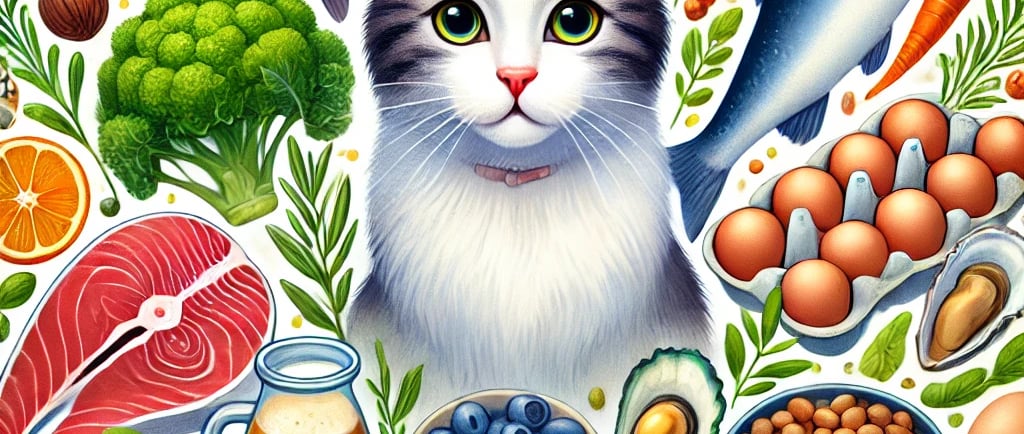Unlocking the Secret to Optimal Cat Health: Essential Whole Foods for Your Feline Friend
Have you ever wondered why your meticulously crafted raw diet might still leave your beloved feline lacking essential nutrients? Many passionate cat parents, myself included, once believed that feeding meat, bones, and organs alone would suffice. Surprisingly, this approach frequently overlooks vital nutrients crucial for your cat’s thriving health and longevity.
Dr. Ghunaim
3/24/20253 min read


Unlocking the Secret to Optimal Cat Health: Essential Whole Foods for Your Feline Friend
Have you ever wondered why your meticulously crafted raw diet might still leave your beloved feline lacking essential nutrients? Many passionate cat parents, myself included, once believed that feeding meat, bones, and organs alone would suffice. Surprisingly, this approach frequently overlooks vital nutrients crucial for your cat’s thriving health and longevity.
The Hidden Nutritional Gaps in Raw Cat Diets
Despite the well-intentioned nature of raw diets modeled on meat, bones, and organs, veterinary research highlights critical deficiencies when specific nutrients aren't addressed adequately. According to the National Research Council (NRC), a standard raw diet often misses essential vitamins, fatty acids, minerals, and amino acids necessary for optimal feline health.
Let's explore these critical nutrients and identify whole food sources to fortify your feline’s diet naturally.
1. B Vitamins – The Energy Catalysts
Cats require substantial daily amounts of B vitamins, particularly Thiamin (B1) and Folic Acid (B9), essential for energy production, nerve function, and red blood cell formation. Insufficient B vitamins can lead to lethargy, neurological disorders, and poor growth. Nutritional yeast and carefully selected organ meats like liver are excellent natural sources.
Research Insight: A study published in the Journal of Animal Physiology and Animal Nutrition confirms nutritional yeast significantly enhances B vitamin profiles in feline diets (Schweigert et al., 2010).
2. Vitamin D – The Sunshine Nutrient (Without the Sun!)
Unlike humans, cats can't synthesize Vitamin D from sunlight. A deficiency can impair bone health and immunity. Fatty fish like salmon, mackerel, and sardines, along with egg yolks, are ideal Vitamin D sources.
Research Insight: A pivotal paper in The Journal of Veterinary Internal Medicine emphasizes dietary sources of Vitamin D are critical, underscoring the dangers of deficiency (Weidner et al., 2017).
3. Vitamin E – Antioxidant Powerhouse
Vitamin E protects your cat’s cells from oxidative damage, supporting overall health and longevity. Fresh eggs and brain tissue are excellent sources, though supplementation is often practical.
Research Insight: Journal of Nutrition studies indicate antioxidant vitamins like E significantly reduce oxidative stress in pets (Jewell et al., 2000).
4. Omega-3 Fatty Acids (EPA and DHA) – The Anti-Inflammatory Allies
Commercially farmed meats often imbalance omega fatty acids, causing inflammation. Including wild salmon, sardines, or krill oil naturally corrects this imbalance, fostering healthy skin, brain, and heart functions.
Research Insight: According to research published in Veterinary Dermatology, omega-3 supplementation markedly improves skin conditions and reduces inflammation in pets (Logas et al., 2014).
5. Essential Microminerals: Iodine, Iron, Manganese, Zinc
These minerals are paramount for metabolic regulation, oxygen transport, and maintaining healthy joints. Seaweed (kelp) ensures iodine adequacy; spleen is a robust source of iron, while blue mussels significantly boost manganese levels. Oysters provide substantial zinc.
Research Insight: Multiple studies, including one from The Veterinary Journal, illustrate the critical role of dietary microminerals in preventing deficiency-related health problems (Davies et al., 2015).
6. Taurine – The Heart and Vision Protector
Cats uniquely depend on dietary taurine for cardiac and ocular health. Raw diets must include fresh meats, especially heart muscle, to meet taurine needs. Ground or cooked meats require supplemental taurine.
Research Insight: Groundbreaking research in Progress in Retinal and Eye Research highlighted taurine’s indispensable role in feline eye health, underscoring its necessity in diets (Ripps & Shen, 2012).
The Power of Whole Foods Over Supplements
Why opt for whole foods rather than multivitamins? Simply put, nutrients from fresh foods boast higher absorption rates, translating into tangible health improvements. Multivitamins often deliver excess nutrients already abundant in balanced diets, potentially causing adverse effects.
Creating Balance: Practical Steps
Introduce small quantities of fatty fish weekly for EPA, DHA, and Vitamin D.
Regularly incorporate organ meats like liver and spleen to address B vitamins and iron.
Provide modest amounts of kelp powder monthly to maintain iodine levels.
Elevate Your Cat’s Health Naturally
Adopting a mindful approach to your cat’s diet, guided by proven science and whole-food principles, can transform your cat’s health. Your feline companion relies on you for their nutritional needs—let’s ensure we’re giving them everything they need to thrive, naturally.
References:
Schweigert et al., (2010). Journal of Animal Physiology and Animal Nutrition.
Weidner et al., (2017). The Journal of Veterinary Internal Medicine.
Jewell et al., (2000). Journal of Nutrition.
Logas et al., (2014). Veterinary Dermatology.
Davies et al., (2015). The Veterinary Journal.
Ripps & Shen, (2012). Progress in Retinal and Eye Research.
